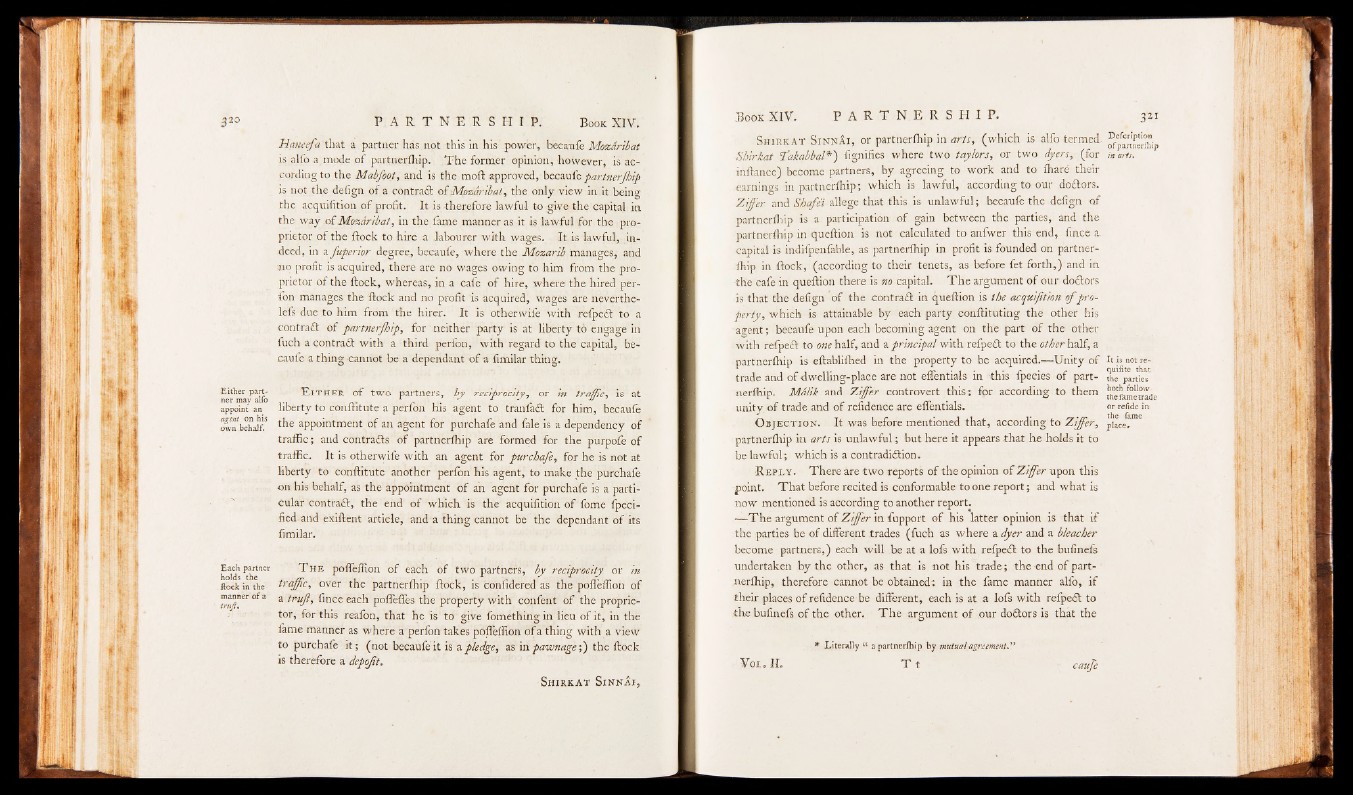
Either partner
may alfo
appoint an
agent on his
own behalf.
Each partner
holds the
ftock in the
manner of a
trufi.
Jianeefa that a partner has not this in his power, becaufe Mozaribat
is alfo a, mode of partnerfhip. The former opinion, however, is according
to the Mabfoot, and is the moft approved, becaufe partnerfhip
is not the defign of a contract of Mozaribat, the only view in.it being
the acquilition of profit. It is therefore lawful to give the capital in
the way of Mozaribat, in the fame manner as it is lawful for the proprietor
of the ftock to hire a labourer with wages. It is lawful, indeed,
in a fuperior degree, becaufe, where the Mozarib manages,' and
no profit is acquired, there are no wages owing to him from the proprietor
of the ftock, whereas, in a cafe of hire, where the hired per-
fon manages the ftock and no profit is acquired, wages are neverthe-
lefs due to him from the hirer, it is otherwife with refpedt to a
contradt of partnerjhip, for neither party is at liberty to engage’in
fuch a contradt with a third perfon, with regard to the capital, becaufe
a thing cannot be a dependant o f a fimilar thing.
E ither of two partners, by reciprocity, or in traffic, is at
liberty to conftitute a perfon His agent to tranfadt for him, becaufe
the appointment of an agent for purchafe and fale is a dependency of
traffic; and contradts of partnerfhip are formed for the purpofe of
traffic. It is otherwife with an agent for purchafe, for he is not at
liberty to conftitute another perfon his agent, to make the purchafe
on his behalf, as the appointment of an agent for purchafe is a particular
contradt, the end of which is the acquilition of feme fpeci-
fied and exiftent article, and a thing cannot be the dependant of its
fimilar.
T h e pofleffion of each of two partners,' by reciprocity ox in
traffic, over the partnerfhip ftock, is confidered as the pofleffion of
a truji, finceeach poflefles the property with confent of the proprietor,
for this reafon, that he is to give fomething in lieu of it, in the
fame manner as where a perfon takes pofleffion of a thing with a view
to purchafe it; (not becaufe it is a pledge, as in pawnage;) the ftock
is therefore a depojit.
S h i r k a t S i n n a i ,
Shir k a t SinnAi , or partnerfhip in arts, (which is alfo termed
Shirkat fakabbq.l*') fignifies where two taylors, or two dyers, (for
inftance) become partners, by agreeing to work and to fhare their
earnings in partnerfhip; which is lawful, according to our dodtors.
Ziffer and Shafei allege that this is unlawful; becaufe the defign of
partnerfhip is a participation of gain between the parties, and the
partnerfhip in queftion . is not calculated to anfwer this end, fince a
capital is indifpenfable, as partnerfhip in profit is founded on partnerfhip
in ftock, (according to their tenets, as before fet forth,) and in
the cafe in queftion there is no capital. T h e argument of our dodtors
is that the defign of the contradt in queftion is the acquijition o f property,
which is attainable by each party conftituting the other his
agent; becaufe upon each becoming agent on the part of the other
with refpedt to one half, and a principal with refpedt to the other half, a
partnerfhip is eftablifhed in the property to be acquired.— Unity of
trade and of dwelling-place are not effentials in this fpecies of partnerfhip.
Malik and Zijfer controvert this; for according to them
unity of trade and of refidence are effentials.
O b j e c t i o n . It was before mentioned that, according to Ziffer,
partnerfhip in arts is unlawful; but here it appears that he holds it to
be lawful; which is a contradiction.
R e p l y . There are two reports of the opinion of Ziffer upon this
point. That before recited is conformable to one report; and what is
now mentioned is according to another report.
— The argument of Ziffer in fupport of his latter opinion is that if
the parties be of different .trades (fuch as where a dyer and a bleacher
become partners,) each will be at a lofs with refpedt to the bufinefs
undertaken by the other, as that is not his trade; the end of partnerfhip,
therefore cannot be obtained-; in the fame manner alfo, if
their places of refidence be different, each is at a lofs with refpedt to
the bufinefs of the other. The argument of our dodtors is that the
* Literally “ a partnerfhip by m utual agreem ent,”
T t
Defcription
o f partnerlhip
in arts.
It is not re-
quifite that
the parties
both follow
the fame trade
or refide in
the fame
place»
Vor. II. caufe